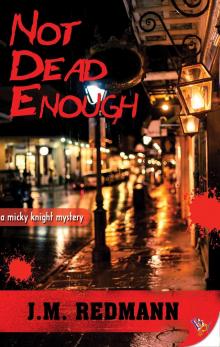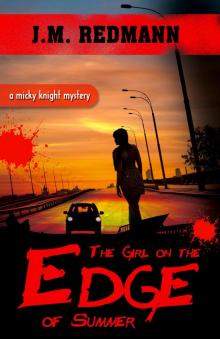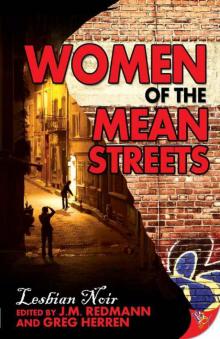- Home
- J. M. Redmann
Not Dead Enough Page 20
Not Dead Enough Read online
Page 20
Back in my room I took a sip of my drink.
I debated calling Karen. But she was safe in Pensacola, ensconced with her social worker girlfriend. If they weren’t asleep, they were otherwise busy. I also thought about calling Joanne, but she was surely asleep. And I’d have to admit I’d gone against her orders to stay in the hotel.
I was caught in half promises and partial lies. Salve was right in trying to get away from the Brande family. She was also right that most of them were criminals at this point, accessories at the very least. Between a big rock and a very hard place. I had no qualms about them screwing over the boy Brandes, taking the money and running. If they broke a few laws that mostly affected lawbreakers, I could shrug and walk away. I doubted Joanne would be so sanguine. She did have to pay attention to the pesky details of the justice system.
But Ellis had seemed taken aback about the body in the morgue. If his side of the Brande family had done it, he would have already known. Might even have hinted it could happen to me, since he was so fond of threats. Or he was not surprised at her death, but surprised I knew about it. Or other Brande men were involved, going behind his back.
Was there a double-cross to the double-cross?
The Brandes wouldn’t keep their dirty money in the local bank where all the tellers would recognize you. It almost had to be in the kind of overseas accounts that were anonymous. Anyone with the account number and access codes would be able to get to them.
Salve hadn’t given me the details, but her hidden expression made me suspect I’d gotten close to it. Ellis kept a close watch over the accounts. Maybe not close enough to prevent someone from getting access to one of them, enough to write a few checks. Enough to scare him into making the hasty decision to move them. But like most Brande men, he didn’t think much about the women, so forgot how much they would notice and see.
For as big an upheaval as moving the power of the family—the money, even if it was only a pile of paper—there would be signs, tension, terse whispers, odd phone calls, the signals women would have to recognize to survive in a family like this one.
I had grown up in a broken family. My mother, far too young at sixteen to have a child, forced away when I was five because of her “unnatural acts”—ones I had inherited from her. The man I called my father, although he wasn’t, killed in a car wreck when I was ten. Taken in by a pious aunt and lump of an uncle who never noticed how their children treated the bastard interloper. Especially my older cousin.
I left when I was eighteen. With help, a band of women who gave me a place to stay, got me into college, the armor of an education to help keep me safe.
I knew what it was like to have to survive in places you weren’t supposed to survive.
I knew how desperate you could be to get out.
I also knew desperation could make you do things that weren’t kind, and if you were desperate enough, you could justify anything.
My conundrum was how much of what Salve told me was true? Did she really have nothing to do with the murder? Had the plan been for Karen and me to be brief pawns and safely bypassed? Or were we disposable?
I wanted to sit in a room with Anmar and Joanne and be honest. But Anmar didn’t know I was a private eye, and if I revealed it now, she might—with good reason—decide not to trust me anymore. If I told Joanne what I knew about Salve, she would be bound to bring her in for questioning and possibly send her to jail. Or back to the Brandes.
I was at a dark crossroads with no signs and no clear direction.
Except to sleep.
I hastily finished my drink, stumbled through the usual, and was in bed just before midnight, the party still going on the street below.
Chapter Fourteen
Between the strange bed, the strange thoughts in my head, and the street noise, I hadn’t slept well.
And no solutions had come with my dreams. Instead I focused on the more immediate decisions of the day—where to go and what to do. I had only booked one night in the hotel, so needed to check out in a few hours.
My office wasn’t safe. Possibly my home would be okay, but there were no women with shotguns downstairs there. If they knew where I lived, I’d be alone.
I made a few decisions. I would hold off calling Karen and Joanne, give Salve a grace period of doubt.
I did call the computer grannies, a group of older women who rented the second floor of my building—at a rate set back when the area was down at heel and not trendy—and did computer work. They had discovered that sitting at a desk with large, bright screens to read was a perfect job for those with arthritic knees, attention to detail, and a knack for sleuthing online. In return for the reasonable rent, they cut me a deal on their work. Plus they were a motley crew of women, save for all being fierce feminists.
I gave them the info on Salve and her business, asked them to track her finances.
“Hack, in other words?” she asked. She was one of the newer grannies. My brain raced for her name. Lena Smith. She swore Smith was her real name.
“Just see what you can find,” I hedged. No, I would not be asking—outright—for illegal stuff.
She gave a low, conspiratorial laugh. “I’m sure I can find something. Call by the end of the day, I might have a few details by then. Probably tomorrow, though.”
I threw in the SUV license and the address, saying they were probably legit, or at least no worse than an unlicensed home vacation rental. But that wasn’t my area of enforcement—unless they were next door to me and throwing late-night noisy parties. I thanked her and hung up.
I looked at the pictures I had taken last night. Not great light, and some were blurry, but I got one good shot of her as she came under the porch light. Better than the earlier security camera shot. I sent it to Karen, no explanation, just asking if it was the woman she had seen.
I would give Salve the time she asked for. But I would still keep digging. I couldn’t risk my life or Karen’s on the word of a woman who had already lied to me.
Damn, I had forgotten to ask her what she was doing talking to a known drug dealer. Although that meant she didn’t know my connection to the bar and my access to the videotapes.
That gave me a direction to go in. I could hang out there, ostensibly to check the recent surveillance. It was an office, had a secure internet connection, and would be safe enough, close to the Rampart Street police station, and Mary was also ex-military and not to be messed with.
I checked out of the hotel and drove the short distance there, finding unmetered parking two blocks away.
I scanned the streets, knowing where Salve’s wariness came from, the constant threat hovering just out of sight. Like a snake, miss the hiss and you’re hurt.
Only heat-bedraggled tourists. When we say humidity, we mean slap you in the face with a hot, wet blanket humidity.
The bar had just opened, the floors still damp from being mopped. Only Mary and Ali were there. I got a club soda and went to the office.
The same verge-of-heat-exhaustion tourists were on the video screen as I’d seen on the street. At least they were too hot to sing “When the Saints Go Marching In.”
I switched from the live feed to the recordings of the last few days, speeding it up to get through and also because it was fun to watch people furiously duck walk.
At least for the first half hour.
The second half hour they just looked stupid. Probably as stupid as I looked sitting here staring at them. There were a few drug deals, but all down the block, looked mostly low key, a bag of weed. A woman getting into a car. The same woman getting out ten minutes later, tucking a folded bill into her bra.
All in all, a slow time on Rampart.
My stomach growled. Hotel room coffee and a granola bar I’d brought with me wasn’t much breakfast. Fortunately it was also lunchtime in the rest of the world, and the bar had started the grill up. I was good—sort of—got the blackened chicken salad. Yeah, with dressing on the side even. Mostly salad day was tomorrow,
but every once in a while it ended up being today.
Then back to the video feed. I didn’t think I’d see anything, but at least this was a place to be. I had to wait until three to check into another hotel. There was little I could do until I heard from the computer grannies. I still didn’t want to call Joanne, as I didn’t want to out and out lie to her by talking to her and not mentioning I’d met with Salve. Or did she go by Sally?
If I ever talked to her again, I’d ask her that as well.
And maybe you won’t solve this, won’t figure it out, will just get by with hiding out until the Brandes have other, more important enemies to fight.
I came to the end of the recorded material and switched back to the live feed. More tourists dripping sweat.
Two homeless women trudging toward the camera, a small shopping cart between them. They moved slowly, trying to stay in the shade. They paused as they came to the door, holding to the shade under the awning. One of them disappeared and came inside.
I opened the door of the office.
“I have a dollar,” she said. “Can I get some water for that?”
Mary pulled two ice-cold bottles of water from behind the bar and brought them to the woman. “Keep your dollar. Too hot to go thirsty.”
“Thank you, you are such a dear.” She hurried out the door.
Mary saw me looking. “About once a week or so. City is cleaning out under the bridge where they usually stay, forcing them onto the streets. They’re on a waiting list for housing, but it can take forever.”
“Yeah, it wasn’t easy before Katrina, but it’s so much harder now, a lot less housing stock and so many places are being gentrified.”
“I try to give the women a bottle of water and a meal. Even if it’s just a bag of chips to take with them.”
“You are a dear,” I said. I went back to the office, retrieved my plate, and took it back to the kitchen area. No one was going to clean up after me.
As I passed back by the bar Mary said, “These two claim they saw someone killed last week. Seemed upset enough that it might be real.”
I nodded. “I guess that happens too much in this city as well. The safe places don’t let the homeless hang out.”
“No, they don’t,” Mary agreed, then went to help a customer.
I headed back to the office, then stopped. Two homeless women. Usually staying under the bridge.
I turned to the door and headed out. They were gone. They couldn’t have gone far. I rushed back into the office and reran the last few minutes of the video. Easier in the air-conditioning to see where they went than running up and down streets.
They continued down Rampart, sucking down the water. A very tall man was walking toward them. Oh, fuck. Junior Boy.
And behind him the man Mary had noted as a drug dealer. The women noticed them, two large men on an empty street. They huddled against the side of the buildings as if they could be small enough to escape notice there. Rabbits seeing wolves.
The drug dealer stopped and the woman closest to him put up her hands as if in protection.
He smiled at her. A leering, ugly grin.
She shook her head. He kept smiling and took something out of his satchel. A baggie with white stuff in it.
Both women shook their heads.
He held out the bag.
One woman again shook her head, then held out the dollar they had offered for the water. Showing it was all they had.
He waved it away. Handed them the bag. Kept smiling. Like he was a benevolent god.
Junior Boy was watching. It was hard to know if he was an amused bystander or a participant. If Druggie didn’t know Junior Boy, it didn’t seem likely that he would be handing out drugs in front of him.
Druggie left the two women looking at the bag.
Junior Boy followed along, enough behind Druggie to not be clearly together, pausing at our door long enough to stare at the rainbow, trans, and leather flags outside. He tried to spit, but was too dehydrated by the heat to do more than drip down his chin. Yes, we know you’re heterosexual, now go wipe your face.
The two women hadn’t moved, as if wondering why the wolf had left them a present.
Then they said a few words and headed across Rampart to Armstrong Park.
I jumped up and ran into the bar. “Mary, Ali, do you still have naloxone here?”
They looked at me.
“Yes, of course,” Mary said.
“Here,” Ali said, grabbing a box from under the bar.
“Grab two doses and follow me,” I said.
Ali and Mary looked at each other. “You go,” Mary said. “I’ll stay here. Should I call the police?”
“Call an ambulance,” I said, already at the door.
Ali followed.
We ran across the street, ducking through the traffic. I headed to where I’d seen them enter the park.
We rushed through the arch, into the sculpture area. Too open, they would be somewhere hidden. Congo Square was to our left, a few musicians there. I turned right, to the pond and islands.
“This way,” I instructed Ali.
I headed for the biggest tree, with bushes around it.
Saw a foot sticking out, then the gleam of the shopping cart.
I heard an urgent whisper. “Sharon, Sharon, you need to wake up. It’s too much. Stand for me.”
One of the women was lying on the ground, the other kneeling beside her. The woman on the ground, presumably Sharon, wasn’t moving, her eyes closed, her breathing raspy and shallow.
The kneeling woman looked up at us, the same scared expression on her face. “We’re okay,” she said quickly, as if fending off a blow.
“No, you’re not,” I said. “It’s bad stuff. We have naloxone. She needs it.”
“You’re not police?” she asked.
“No, we’re not,” Ali said. “I train people at the needle exchange on how to do this,” she added, getting on one knee next to the comatose woman.
I’d read a pamphlet and it was supposed to be easy, but I was glad to have someone else who really knew what they were doing.
I took the other woman by the arm and helped her stand out of the way. I had questions, but now was not the time. I needed to gain her trust first.
“She’s Sharon?” I asked.
The woman nodded.
“And you are?”
“Margaret,” she said, her eyes never leaving the woman on the ground. “We didn’t mean to, she’s struggled so long, was doing so well. But…we got kicked out of the place we had under the bridge, a group of us together all looking out for one another. Two nights ago. Now we take turns sleeping. Haven’t eaten in almost a day. Hot and tired and hurting, walking for so long. And…she just wanted to get away from it all for a few hours.” She started crying.
“Hey, Margaret, I’m Micky and that’s Ali. I drink more than I should, especially when problems pile up and I just want to get away from them.”
She looked at me briefly, then back at her friend. “She was doing so well. Three months now. We might get a place to stay, a real apartment, in a few weeks.”
The two women were younger than they had first appeared, probably mid-twenties, old enough to have made mistakes with consequences but young enough to get past the consequences.
“Who was the man who gave you the bag?” I asked.
She again looked at me. “You sure you’re not a cop?”
“I promise I’m not a cop. I’m a private detective.” I took out my license to show it to her. She looked it over carefully, squinting as if she needed glasses. She handed it back to me.
The woman on the ground sputtered and thrashed onto her side.
“Sharon!” her friend called.
“What the hell?” Sharon muttered. “Where am I? Why is it still so fucking hot?”
“You’re in the park. It was bad stuff. You looked like you weren’t coming back.”
“What the hell?”
“You were given a bad dose,”
Ali said.
“That bastard,” she muttered. “Should have known better than to take anything from him.”
A siren wailed, coming closer.
“I’m okay,” Sharon said, trying to sit up.
“No, you’re not,” Margaret said. “Let’s take a rest. We have the cards now.”
“The cards?”
“Medicaid. We got signed up over at that new place on Elysian Fields. So we can get care.”
Ah, yes, Louisiana had expanded Medicaid a few years ago.
The siren stopped, just outside the park.
I loped out from the trees far enough for them to see me and waved the EMTs over.
They were quick and professional, the woman EMT telling Sharon, “You’re way dehydrated. Let’s take you in to check you out.”
“I need to go with her,” Margaret said.
The two EMTs looked at each other.
“I’ll give you a ride,” I offered. Everyone nodded at my solution. I had my motives, of course, other than being a Good Samaritan. I had questions Margaret and Sharon might be able to answer.
She, Ali, and I followed the stretcher out of the park, watching them load it in. Then Ali headed back to the bar and I led Margaret to where my car was.
“You think she’ll be okay?” she asked as we got in.
I turned on the AC full blast and opened the windows to let the hot air escape. It was blistering and, well, sleeping on the streets isn’t the most attractive of odors.
“She’ll be okay,” I said and pulled out. Then added honestly, “At least for now. Once the overdose is reversed, it’s okay. It’s just the next steps are hard.”
“Yeah, I know. She’s been really good, too.”
“You don’t use?”
“Did once. How I lost my job and my home. Got a record now. It’s hard to get a job with a rap sheet.”
“Yeah, it is,” I agreed. “What are you good at? What kind of work have you done?”
“I wasn’t good at much, stupid kid, fooling around when I should’ve been studying.”
“High school? College?”
“One year in UNO. Dropped out before I could flunk out. Yeah, I know, I need to go back.”

 Not Dead Enough
Not Dead Enough Ill Will
Ill Will The Shoal of Time
The Shoal of Time The Girl on the Edge of Summer
The Girl on the Edge of Summer Women of the Mean Streets
Women of the Mean Streets J.M. Redmann - Micky Knight Mystery 7 - I'll Will
J.M. Redmann - Micky Knight Mystery 7 - I'll Will